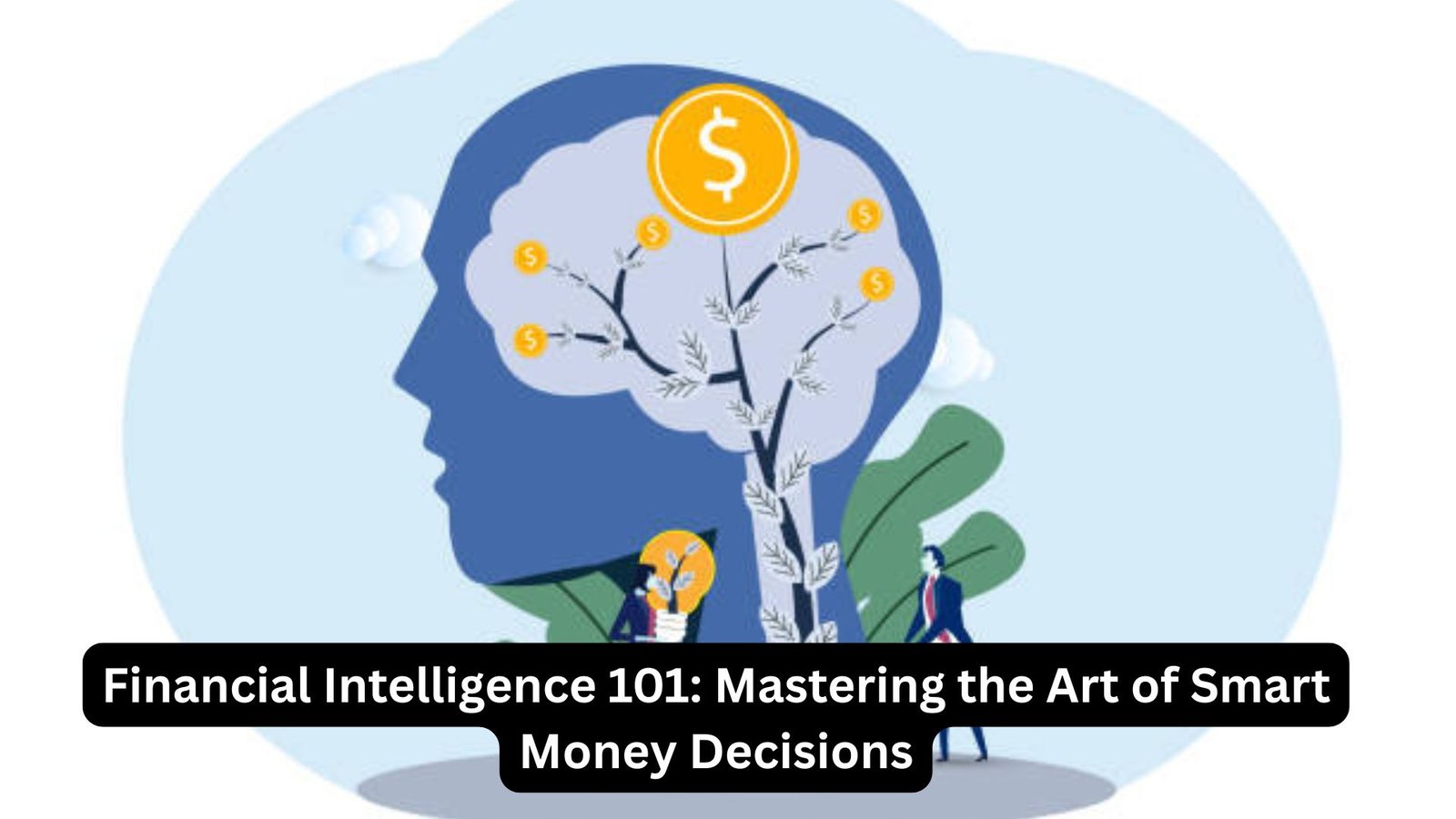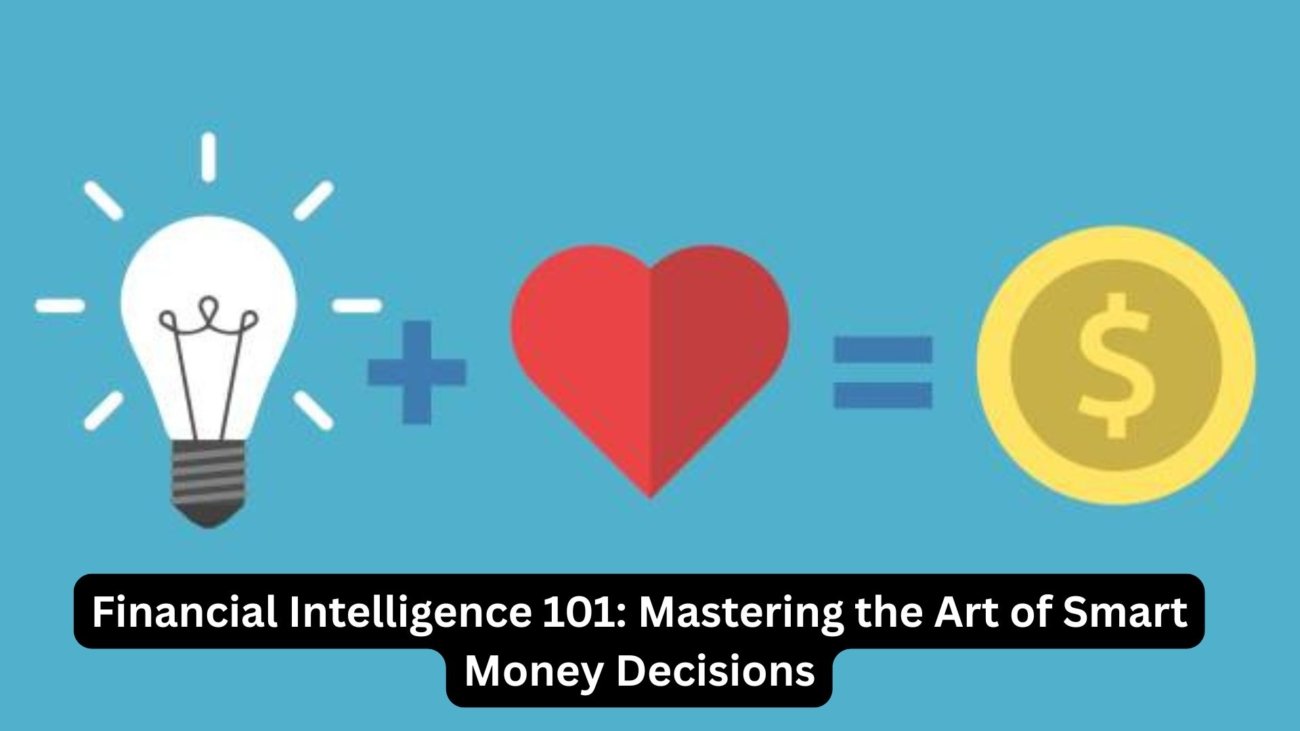
Financial intelligence isn’t just about making money — it’s about keeping it, growing it, and using it wisely.
While many people focus solely on earning more, true wealth comes from smart decision-making, disciplined habits, and strategic thinking.
Whether you’re just starting your financial journey or looking to refine your strategy, this article will help you make smarter money moves.
What Is Financial Intelligence?
Financial intelligence (FQ) is the ability to understand, manage, and optimize your financial resources.
It goes beyond basic math — it’s about behavior, discipline, and foresight.
Key Traits of Financially Intelligent People:
They track their money (no blind spending)
They invest early (time is their biggest asset)
They avoid debt traps (unless it’s strategic)
They continuously educate themselves (markets, taxes, trends)
They think long-term (delayed gratification pays off)
The Psychology of Smart Money Decisions
1. Emotional Spending vs. Rational Spending
Many financial mistakes happen because of impulse buys, lifestyle inflation, or emotional spending (retail therapy, anyone?).
How to Fix It:
– Use the 24-hour rule — Wait a day before big purchases.
– Budget for fun — Allocate a small “guilt-free” spending category.
– Identify triggers — Stress? Boredom? Address the root cause.
2. The Scarcity vs. Abundance Mindset
– Scarcity Mindset: “I’ll never have enough.” → Hoarding, fear-driven decisions.
– Abundance Mindset: “Opportunities exist.” → Invests, takes calculated risks.
Shift Your Thinking:
– Focus on growth opportunities (side hustles, skill-building).
– Replace “I can’t afford this” with ”How can I afford this?”
Budgeting Like a Pro
A budget isn’t restrictive — it’s a roadmap to financial freedom.
The 50/30/20 Rule (Simplified Budgeting)
– 50% Needs (rent, groceries, bills)
– 30% Wants (dining out, entertainment)
– 20% Savings/Investments (future you will thank you)
Advanced Budgeting: Zero-Based Budgeting
Every dollar has a job:
1. Income — Expenses — Savings = $0
2. No “leftover” money means **no wasted spending.
Investing 101: Making Your Money Work for You
Why Investing Beats Saving Alone
– Inflation erodes cash value over time.
– Compound interest turns small, consistent investments into wealth.
Where to Start?
1. Emergency Fund (3–6 months of expenses) → High-yield savings account.
2. Retirement Accounts (401(k), IRA) → Tax advantages.
3. Index Funds/ETFs (Low-risk, diversified).
4. Real Estate or Side Businesses (Cash-flow assets).
Debt: Good vs. Bad
Bad Debt
– High-interest (credit cards, payday loans).
– Funds depreciating assets (like luxury cars).
Good Debt
– Low-interest, tax-deductible (mortgages, student loans).
– Used to generate income (business loans, real estate).
Strategy: Pay off high-interest debt first (avalanche method), then invest.
Avoiding Common Financial Mistakes
Living Beyond Means (Keeping up with trends = broke).
No Emergency Fund (One crisis away from debt).
Timing the Market (Invest consistently — don’t gamble).
Ignoring Taxes (Use tax-advantaged accounts!).
Building a Wealth Mindset
1. Pay Yourself First
Before bills, before spending — save/invest at least 20%.
2. Focus on Assets, Not Just Income
– Assets put money in your pocket (dividends, rental income).
– Liabilities take money out (car payments, mortgages).
3. Never Stop Learning
– Read books (”Rich Dad Poor Dad,” “The Intelligent Investor”).
– Follow finance experts (Ramit Sethi, Warren Buffett).
Final Thoughts: Financial Freedom Is a Skill
Financial intelligence isn’t inherited — it’s learned and practiced.
By mastering smart money habits, avoiding pitfalls, and thinking long-term, you can build lasting wealth.


маркетплейс аккаунтов услуги по продаже аккаунтов
перепродажа аккаунтов маркетплейс аккаунтов соцсетей
аккаунт для рекламы аккаунт для рекламы
магазин аккаунтов заработок на аккаунтах
аккаунт для рекламы https://birzha-accauntov.ru/
маркетплейс аккаунтов купить аккаунт с прокачкой
магазин аккаунтов социальных сетей купить аккаунт с прокачкой
платформа для покупки аккаунтов маркетплейс аккаунтов
покупка аккаунтов перепродажа аккаунтов
маркетплейс для реселлеров https://prodat-akkaunt-online.ru/
маркетплейс для реселлеров профиль с подписчиками
купить аккаунт заработок на аккаунтах
Account market Purchase Ready-Made Accounts
Marketplace for Ready-Made Accounts Account Trading Service
Account Market Secure Account Purchasing Platform
Account Exchange Service Profitable Account Sales
Account Buying Service Buy Pre-made Account
Buy Pre-made Account Database of Accounts for Sale
Account Catalog Account Trading Platform
Account Market Accounts for Sale
Sell Account accountsmarketplaceonline.com
Account Sale Buy accounts
Social media account marketplace Account exchange
account buying service account market
account trading verified accounts for sale
account exchange account market
purchase ready-made accounts sell pre-made account
buy pre-made account account marketplace
database of accounts for sale online account store
verified accounts for sale gaming account marketplace
profitable account sales verified accounts for sale
account trading platform account exchange service
buy and sell accounts account market
account market guaranteed accounts
secure account sales account acquisition
buy pre-made account guaranteed accounts
account acquisition account buying service
account marketplace account trading
guaranteed accounts account selling service
accounts market account market
ready-made accounts for sale buy and sell accounts
account sale accounts market
account market https://account-buy.org/
ready-made accounts for sale account selling service
online account store accounts-market-soc.org
account trading website for selling accounts
account selling platform profitable account sales
sell pre-made account online account store
ready-made accounts for sale account sale
website for buying accounts https://top-social-accounts.org
find accounts for sale https://accounts-offer.org
gaming account marketplace https://accounts-marketplace.xyz
account trading platform buy accounts
secure account sales https://social-accounts-marketplaces.live
ready-made accounts for sale accounts market
profitable account sales https://social-accounts-marketplace.xyz
sell account https://buy-accounts.space
marketplace for ready-made accounts https://buy-accounts-shop.pro
account buying service https://buy-accounts.live
buy and sell accounts https://social-accounts-marketplace.live
sell accounts https://accounts-marketplace.online
маркетплейс аккаунтов соцсетей купить аккаунт
маркетплейс аккаунтов https://rynok-akkauntov.top/
продать аккаунт https://kupit-akkaunt.xyz/
маркетплейс аккаунтов купить аккаунт
продать аккаунт https://akkaunty-market.live
маркетплейс аккаунтов https://kupit-akkaunty-market.xyz
площадка для продажи аккаунтов https://akkaunty-optom.live/
магазин аккаунтов online-akkaunty-magazin.xyz
продажа аккаунтов akkaunty-dlya-prodazhi.pro
продать аккаунт kupit-akkaunt.online
buy accounts facebook buying facebook ad account
buy facebook ads accounts https://buy-ad-accounts.click
buy facebook ads account https://buy-ad-account.top
facebook accounts for sale https://ad-account-buy.top
facebook ad account for sale https://buy-ads-account.work
buying fb accounts https://ad-account-for-sale.top
buy aged facebook ads accounts https://buy-ad-account.click
buy a facebook account buy facebook account for ads
buy google adwords accounts https://buy-ads-account.top/
buy google ads account buy google ad threshold account
buy fb ad account https://buy-accounts.click
buy google ads accounts buy google ads agency account
buy verified google ads account https://ads-account-buy.work
buy google ads agency account https://buy-ads-invoice-account.top
buy google ads threshold account https://buy-account-ads.work
buy google ad account https://buy-ads-agency-account.top/
buy account google ads buy google ads accounts
google ads account seller https://ads-agency-account-buy.click
buy facebook ads accounts and business managers buy-business-manager.org
buy google ads account https://buy-verified-ads-account.work
business manager for sale https://buy-bm-account.org/
unlimited bm facebook https://buy-business-manager-acc.org
facebook bm buy buy verified business manager facebook
buy business manager account buy-verified-business-manager.org
buy verified business manager facebook business-manager-for-sale.org
buy facebook bm account https://buy-business-manager-verified.org
verified bm for sale verified bm
buy fb bm verified-business-manager-for-sale.org
buy facebook bm account https://buy-business-manager-accounts.org
buy tiktok ads https://buy-tiktok-ads-account.org
tiktok agency account for sale https://tiktok-ads-account-buy.org
tiktok ad accounts https://tiktok-ads-account-for-sale.org
tiktok agency account for sale https://tiktok-agency-account-for-sale.org
tiktok ads account buy https://buy-tiktok-ad-account.org
tiktok ads account for sale https://buy-tiktok-ads-accounts.org
tiktok ads agency account tiktok ads account buy
tiktok ad accounts https://buy-tiktok-business-account.org
buy tiktok ads account https://tiktok-ads-agency-account.org